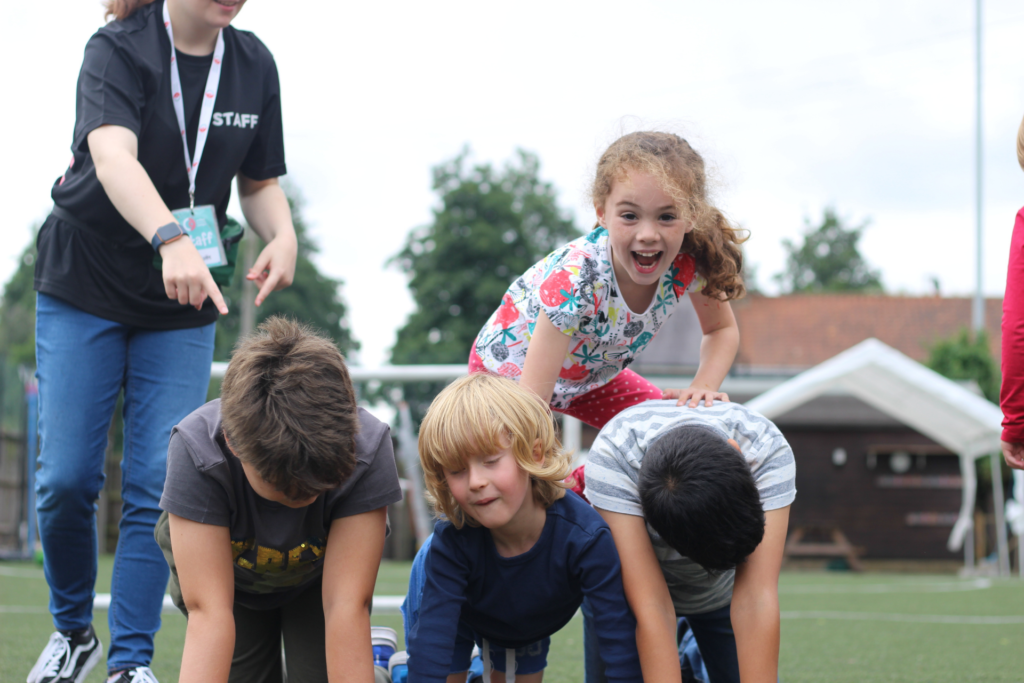SHARE
This April, it’s Stress Awareness Month. Our blog tackles the subject of how to manage stress in children – the causes, signs, and ways to help minimise or manage it.
Stress: the situation today
There is an overwhelming increase in people suffering stress – in the UK and across the world.
Sadly, it is not something unique to adults and rising at an alarming rate among children. Yet the disruption caused over the past two years since Covid arrived, including lockdowns, school closures and limited social activities, have helped amplify the situation.
The causes of child stress are widespread. Some say the growth in technology and it’s becoming easier to access are part to blame. Others say life, in general, is becoming trickier to navigate, with increasing pressure to succeed in and beyond school reaching new heights, and too much for many young people to cope with. Whether it’s a combination of multiple factors affecting an individual or a single root cause, one thing is certain: stress is complex, and no one-size-fits-all approach can banish it.

The good news about stress in children
Thankfully, stress is no longer something swept under the carpet or a topic to be ashamed of. Instead, children are more aware of ways to manage well-being, with many schools and youth organisations providing mechanisms to help them navigate life’s challenges.
What’s more, stress or anxiety in most children is only temporary. Working closely with your child to recognise and resolve stress, you can equip them to overcome any hurdles and achieve a balanced, happy and less-stressful life.
Recognising stress in children
If only it were as simple as a child telling you, “I’m feeling stressed”. While some can verbalise their inner concerns, many are not – and you will need to put on your detective hat, ready to pick up on the common signs of stress. They include:
Physical changes
Feeling ill: Complaints about having headaches, a sore tummy, chest pains, or fatigue can all be signs of suffering anxiety or stress.
Sleep disruption: Stress raises hormone levels which can make resting difficult. When an otherwise sound sleeper starts to wake up during the night, suffer night terrors or begin sleepwalking, perhaps even wetting their bed, this might be down to anxiety or stress.
Emotional changes
Aggression: Lashing out – particularly when the behaviour is out of the blue, could point to something underlying that’s not quite right.
Withdrawal: The opposite of outward behaviour, your child may suddenly become withdrawn and opt to spend time alone – which, if this isn’t their typical behaviour, might be down to stress.
Some children may even begin to tell you they are struggling, whether it’s outright or just by using certain language – choosing words like annoyed, angry, confused or sad.

Stress causes
While we know there can be many causes, before you can help resolve their stress, a child needs your support in getting to the root of their issue. It could be an obvious reason or much less so; either way, it needs clarity to help everyone move forward.
Home life. Maybe some family issues are proving difficult for the child to deal with. Has there been a recent bereavement or separation? Perhaps a parent has fallen ill and can no longer work – or lost their job, causing financial strain on the family.
How about the less apparent causes? Perhaps your child is being pushed to pursue an activity they don’t enjoy, based on your thinking it’s good for them – like a sport-based club. And while physical activity is great, there might be one more suited to their ability or personality – for example, a dance or drama class.
School life. Perhaps friendships are becoming tested, or there is a disagreement between your child and their teacher that you are unaware of. Or your child is having difficulty with a particular concept, left feeling like they’re not capable or falling behind on their work.
If nothing seems apparent as a root cause of the stress, talk with your child about what’s happening in and out of school. Many will open up once you take the time to ask them.
How to manage stress in children
As humans, we have learned about stress management is the importance of talking. Unfortunately, chatting openly about how they feel is not so straightforward for many young people!
One way to encourage two-way dialogue is to speak openly with your children from an early age. Give them a platform to speak and answer questions about their day, and do it frequently to become familiar with the concept. And tell them about your day too – including the not so great parts! It shows your child that terrible days happen and what you did to overcome your challenges.
Of course, teens are a trickier bunch and not always the most open to talking with a parent – even the chatty ones! Again, providing a constant and consistent approach can help them understand it’s OK not to be OK and that you’re here to help. Keep the language positive, focused on support, and remind them they are not alone.
Thankfully, if a child won’t talk to you about their challenges, then there are other people they can approach. Schools are actively supporting stress management nowadays, many with a direct line of support for wellbeing. Outside of school, too, much is being done to provide young people with spaces to stay busy, active and safe. Most clubs have a nominated safeguarding officer to help deal with situations and offer support.

Preventing stress in children
Something we have all become familiar with in recent years is balance. To lead a healthy life – that’s in mind as well as in body – three fundamentals help us:
A good night’s sleep
Sleeping time repairs the body and resets the mind for the next day’s learning. Young people must sleep well – medical experts recommend 9 to 10 hours or more for primary school-aged juniors or 8 to 9 hours for those in senior school.
A nutritious diet
Fatty and processed foods filled with sugar are not good for us: fact! We all love treats, but it’s about limiting them to remain treats rather than becoming a daily feature. Eating a balanced diet filled with many nutritious, fresh foods makes us feel good in mind and body.
Physical activity
When we exercise, our body releases endorphins which trigger the brain to feel happy. So, people who exercise frequently feel happier than those who don’t. Simple!
It’s worth remembering that while these life fundamentals all act effectively to help prevent stress, they are equally crucial to managing stress when it occurs too.
Stress-busting with United Education!
Did somebody mention physical activity? It’s what our School Holiday Camps are all about!
That’s one of your child’s three fundamentals for a healthy lifestyle covered!
Our multi-activity camps are very much a space to be active, with different sports, games and recreation our campers enjoy – great news for your child’s body, mindset and stress prevention. At each Adventure Camp, we enrich young people’s minds by meeting new people, learning social skills, and trying new activities.
But Camp days are about much more than staying active – in fact, some campers don’t want to be on the go all day and appreciate their chill-out time too! Our leaders are trained to recognise the different personality types and work with each child as an individual. So, if they don’t want to be involved in an activity and need time to themselves, that’s OK. Besides, there are plenty of ways to stay mindful on camp, with plenty of options like crafting, reading, and yoga.
One thing is sure: your child won’t find any tech on camp. It’s not that we’re against tech; we use it ourselves for efficient check-in and camp day management. In fact, using tech teaches children many useful skills they will carry through life, like independence and the ability to think and act quickly. We prefer children to step away from tech when they are with us, giving them time to try different activities and skills out for size. It helps them to appreciate the multiple benefits physical activity in the great outdoors can bring.
Parenting: it’s not easy!
What if you, the parent, is suffering from stress?
It’s not a surprise when you consider all that’s expected of a parent. Working – perhaps managing more than one job – and looking after a family, with all the responsibility that brings. Trying your best to implement rules and structure so your children understand limits. Making sure your little ones are fed, watered, clothed and well-slept. At times, it’s a relief knowing you’ve packed the children off safely to school or day camp just to spend five minutes on your own and breathe…
Grown-ups need support, too, and thankfully there are more places to turn for support than ever. Mental health hubs are available across the UK as a space for people to go and speak with a support worker about their wellbeing. Some companies offer this to staff now as standard practice. Others recognise the link between physical and mental health and offer subsidies to staff for gym membership, bike-to-work schemes and other schemes to stay active.
If you do need to talk to someone about how you’re feeling, organisations such as Mind and Samaritans are a great help.
SHARE
RELATED ARTICLES

Llama
Automated, compliant and safer recruitment in education. Llama ID streamlines and automates safeguarding and vetting checks for schools and multi-academy trusts- all within a single

Study Links
Founded in 1998 and recognised as an award-winning family-run business, we are proud to say that we are one of the UK’s leading and most

Youth Sport Trust
The Youth Sport Trust equips educators and empowers young people with the vision of creating a future where every child enjoys the life-changing benefits of

Scope
We’re a strong community of disabled and non-disabled people with a shared vision of equality. We provide practical advice and emotional support whenever people need

United Family
To all the United family, You are the backbone of United Education. For over 5 years I have been humbled by the pride you all

What is on offer at our Adventure Camps
The fun never stops at United Adventure Camps! The end of the summer holidays is upon us once more. How can so many weeks whizz

